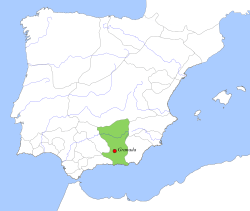Taifa of Granada
The Taifa of Granada (Arabic: طائفة غرناطة, Ta'ifat Gharnata) was a Berber[1] emirate in Al-Andalus, roughly corresponding to the modern province of Granada, Spain, in southern Spain. The emirate originated in 1013 and lasted until 1091.
Taifa Kingdom of Granada طائفة غرناطة Reino Taifa de Granada | |||||||
|---|---|---|---|---|---|---|---|
| 1013–1145 | |||||||
 Taifa Kingdom of Granada, c. 1037. | |||||||
| Capital | Granada | ||||||
| Common languages | Arabic, Berber, Mozarabic, Hebrew | ||||||
| Religion | Islam, Roman Catholicism, Judaism | ||||||
| Government | Emirate | ||||||
| Historical era | Middle Ages | ||||||
• Downfall of Caliphate of Córdoba | 1013 | ||||||
• To the Almoravids | 1090–1145 | ||||||
• Annexion to the Almohads | 1145 | ||||||
| Currency | Dirham and Dinar | ||||||
| |||||||
| Wikimedia Commons has media related to Taifa of Granada. |
Visigoths
"Garnata" or "Garnata al-Yahud" (Granada of the Jews) was a settlement next to the town the Christians called "Elvira", after the former Iberian name "Ilbira".
Granada as a polity
The nearby Iberian (pre-Roman) town of Elvira became the capital of the Al-Andalus Caliphate of Córdoba province. Civil conflicts that wracked the Caliphate in the early eleventh century led to the destruction of the city in 1010. Zawi ben Ziri, the Zirid, was chief of one of the Berber armies that took part in the Caliphate civil war that destroyed Medina Azahara in Córdoba, and later destroyed Medina Elvira. Under his leadership the Elvira townsmen abandoned the provincial capital and established themselves in the Jewish settlement of Gharnata al-Yahud, thereby founding the city of Granada. He founded the first Taifa of Granada kingdom and moved the capital from Elvira to Garnata al-Yahud.
The Zirid was a Berber Sanhaja family from the region of Kabylia in Algeria whose members became chiefs and kings in many other Islamic regions, such as in Tunisia.
Role of the Jews
"The peak of Sephardic Judaism as a political as well as cultural reality is found in eleventh-century Granada. The Zirid state that existed for half a century was a Jewish kingdom in everything but name. The Muslim ruler was a powerless figurehead."[2] Jews did not hold the foreigner (dhimmi) status typical of Islamic rule. A Jew, the rabbi, scholar, and poet Samuel ha-Nagid, commanded an army, something not seen again until the modern state of Israel.[2] It has been said that the power and status of the Granadan Jews was not only unique in al-Andalus, but in the entire Islamic world.[3]:170
The Taifa of Granada kingdom ended after conquest by the Berber Almoravid dynasty in 1091, who took the territory and united it with others in their dynasty.
List of Emirs
Zirid dynasty
- Zawi ben Ziri: 1013–1019/20
- Habbus al-Muzaffar: 1019/20–1038
- Badis ben Habus: 1038–1073
- Abdallah ibn Buluggin: 1073–1090
Almoravids: 1090–1145
Huddid dynasty
- Abu Dja'far Ahmad "Zafadola"(also Cord., Jaen): 1145
- To Almohads: 1145–1237
See also
- Emirate of Granada
- Al-Andalus
- History of Islam
- History of Spain
- List of Sunni Muslim dynasties
Notes
- Shoham, Shlomo (2008-12-18). Ark in the Authentic Domain. Cambridge Scholars Publishing. p. 45. ISBN 9781443802673.
- Eisenberg, Daniel (1999). "'La escondida senda': Homosexuality in Spanish history and Culture". In Foster, David William (ed.). Spanish Writers on Gay and Lesbian Themes. A Bio-Critical Sourcebook. Westport, Connecticut: Greenwood. pp. 1–21. ISBN 0313284792.
- García Sanjuán, Alejandro (2004). "Violencia contra los judíos: el pogromo de Granada del año 459 H/1066". In Fierro, Maribel (ed.). De muerte violenta: política, religión y violencia en al-Andalus. Madrid: Consejo Superior de Investigaciones Científicas. pp. 167–206. ISBN 8400082680.